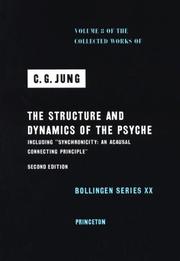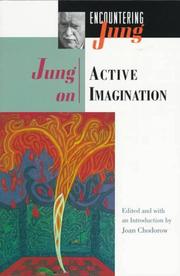| Listing 1 - 2 of 2 |
Sort by
|

ISBN: 9780691097749 0691097747 0691259453 1306408776 1400850959 9780691259451 9781400850952 Year: 2014 Publisher: Princeton, NJ : Princeton University Press,
Abstract | Keywords | Export | Availability | Bookmark
 Loading...
Loading...Choose an application
- Reference Manager
- EndNote
- RefWorks (Direct export to RefWorks)
A revised translation of one of the most important of Jung's longer works. The volume also contains an appendix of four shorter papers on psychological typology, published between 1913 and 1935.
Psychoanalysis. --- Analogy. --- Analytical psychology. --- Apprehension (understanding). --- Archetype. --- Astrology. --- Auditory hallucination. --- Bibliography. --- Causality. --- Certainty. --- Cherry picking. --- Coincidence. --- Collective unconscious. --- Concept. --- Consciousness. --- Criticism. --- Delusion. --- Determination. --- Disposition. --- Dissociation (psychology). --- Edition (book). --- Existence. --- Explanation. --- Extrasensory perception. --- Extraversion and introversion. --- Feeling. --- Four Evangelists. --- Hallucination. --- Horoscope. --- Human behavior. --- Hypothesis. --- Imagination. --- In Spring. --- Indication (medicine). --- Individuation. --- Inference. --- Inferiority complex. --- Instinct. --- Intellect. --- Intention. --- Lecture. --- Level of consciousness (Esotericism). --- Libido. --- Materialism. --- Mental disorder. --- Neurosis. --- Objectivity (philosophy). --- Observation. --- Parapsychology. --- Perception. --- Personal unconscious. --- Personality. --- Pessimism. --- Phenomenon. --- Philosopher. --- Philosophy. --- Potentiality and actuality. --- Prejudice. --- Principle. --- Probability. --- Psyche (psychology). --- Psychiatry. --- Psychic. --- Psychological Types. --- Psychological research. --- Psychology and Alchemy. --- Psychology of the Unconscious. --- Psychology. --- Psychopathology. --- Psychotherapy. --- Quantity. --- Reality. --- Reason. --- Reminiscence. --- Requirement. --- Result. --- Schizophrenia. --- Science. --- Scientist. --- Self-deception. --- Self-knowledge (psychology). --- Sexual fantasy. --- Sigmund Freud. --- Skepticism. --- Suggestion. --- Symbols of Transformation. --- Sympathy. --- Symptom. --- Telepathy. --- Temperament. --- Textual criticism. --- Theory of Forms. --- Theory. --- Thought. --- Thus Spoke Zarathustra. --- Transference. --- Two Essays on Analytical Psychology. --- Unconsciousness. --- World view. --- Writing.

ISBN: 0691015767 1322882010 1400866855 Year: 2015 Publisher: Princeton, NJ : Princeton University Press,
Abstract | Keywords | Export | Availability | Bookmark
 Loading...
Loading...Choose an application
- Reference Manager
- EndNote
- RefWorks (Direct export to RefWorks)
All the creative art psychotherapies (art, dance, music, drama, poetry) can trace their roots to C. G. Jung's early work on active imagination. Joan Chodorow here offers a collection of Jung's writings on active imagination, gathered together for the first time. Jung developed this concept between the years 1913 and 1916, following his break with Freud. During this time, he was disoriented and experienced intense inner turmoil --he suffered from lethargy and fears, and his moods threatened to overwhelm him. Jung searched for a method to heal himself from within, and finally decided to engage with the impulses and images of his unconscious. It was through the rediscovery of the symbolic play of his childhood that Jung was able to reconnect with his creative spirit. In a 1925 seminar and again in his memoirs, he tells the remarkable story of his experiments during this time that led to his self-healing. Jung learned to develop an ongoing relationship with his lively creative spirit through the power of imagination and fantasies. He termed this therapeutic method "active imagination." This method is based on the natural healing function of the imagination, and its many expressions. Chodorow clearly presents the texts, and sets them in the proper context. She also interweaves her discussion of Jung's writings and ideas with contributions from Jungian authors and artists.
Jungian psychology. --- Psychoanalysis. --- Subconsciousness. --- Active imagination. --- Jung, C. G. --- Active imagination. --- Adlerian. --- Allusion. --- Analogy. --- Analytical psychology. --- Anima and animus. --- Anthropomorphism. --- Antithesis. --- Apotropaic magic. --- Archetype. --- Art therapy. --- Astrology. --- Author. --- Career. --- Carl Jung. --- Causality. --- Certainty. --- Cherry picking. --- Circumference. --- Clockwise. --- Cloister. --- Co-operation (evolution). --- Consciousness. --- Critical period. --- Criticism. --- Dialectic. --- Direct experience. --- Disgust. --- Dissociation (psychology). --- Dream interpretation. --- Explanation. --- Extraversion and introversion. --- Feeling. --- Free association (psychology). --- Hallucination. --- Humility. --- Ibid. --- Imagination. --- Indication (medicine). --- Individuation. --- Inner Experience. --- Inner critic. --- Introspection. --- Invention. --- Lao-Tzu. --- Lecture. --- Libido. --- Literature. --- Loneliness. --- Mental image. --- Mood (psychology). --- Multitude. --- Mysterium Coniunctionis. --- Neglect. --- Neurosis. --- Nihilism. --- Oppression. --- Parapsychology. --- Personality. --- Phenomenon. --- Philosophy. --- Potentiality and actuality. --- Prejudice. --- Prima materia. --- Principle. --- Probability. --- Psyche (psychology). --- Psychoanalysis. --- Psychologist. --- Psychology and Alchemy. --- Psychology. --- Psychotherapy. --- Puberty. --- Rapprochement. --- Rationality. --- Reality. --- Reincarnation. --- Result. --- Sanskrit. --- Self-confidence. --- Self-deception. --- Self-knowledge (psychology). --- Sigmund Freud. --- Singing. --- Suffering. --- Suggestion. --- Suicide. --- Symptom. --- Temperament. --- The Erotic. --- The Interpretation of Dreams. --- The Secret of the Golden Flower. --- Therapeutic effect. --- Thought. --- Toni Wolff. --- Transference. --- Two Essays on Analytical Psychology. --- Uncertainty. --- Wreath. --- Writing.
| Listing 1 - 2 of 2 |
Sort by
|

 Search
Search Feedback
Feedback About UniCat
About UniCat  Help
Help News
News